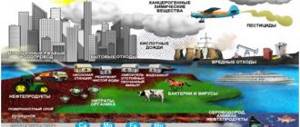Signs of law
Law has a number of specific features that distinguish it.
So, right:
- This is a system of norms regulating human behavior. All of them are interconnected, their goal is to regulate relations in all spheres of society;
- Established exclusively by the state;
- It is mandatory for all citizens and the state;
- Is under state protection. In order to monitor compliance with legal norms, the state acts through law enforcement agencies, various structures that can use force against violators;
- It consolidates the state and social system, that is, the law creates order in society, precisely defining what is allowed to do and what is prohibited.
The right takes the form of a mandatory norm when it is expressed in the form of a law. But at the same time, the law will be legal only when it corresponds to recognized norms.
Right. Social science. Unified State Exam (grade 11)
5.3 Concept and types of legal liability Legal liability, its types (disciplinary, administrative, criminal, civil, material), principles and functions.
Offense, signs, types (crime and misdemeanor). Types of misconduct. The difference between a crime and a misdemeanor. Types and categories of crimes. 5.4 Constitution of the Russian Federation. Fundamentals of the constitutional system of the Russian Federation The Constitution as the fundamental law of the Russian Federation. Features, content, functions of the Constitution. Characteristics of the Russian Federation, rights and freedoms enshrined in the Constitution. The principle of separation of powers (legislative, executive, judicial). Principles of organization of state power. Constitutional law of the Russian Federation. Rights and freedoms of man and citizen (personal, political, economic, social, cultural rights). Basic responsibilities of a citizen of the Russian Federation. Legal status of a person and a citizen. Signs of a welfare state.
5.5 Legislation of the Russian Federation on elections
Law on elections.
Voting rights in the Russian Federation (active and passive). Principles of suffrage. Election stages. Election process (stages). 5.6 Subjects of civil law
The concept of property. Contents of property rights, forms of ownership (private, state, municipal). Grounds for acquisition and termination of property rights. Civil relations. Subjects, objects, types, participants in civil legal relations. Civil law as a branch of law, sub-branches of law. Principles of civil law. Legal status of minors. 5.7 Organizational and legal forms and legal regime of entrepreneurial activity Business partnerships and societies, cooperatives, state and municipal unitary enterprises. Commercial and non-profit organizations. Individual entrepreneurs and peasant farms. The concept of business law (subject). Types, characteristics, forms of entrepreneurial activity. 5.8 Property and non-property rights Types of property rights (real and liability rights). Classification of things (movable and immovable, simple and complex). Personal non-property rights. Concept and types of obligations. Ways to ensure fulfillment of obligations. Ways to protect civil rights. Transactions in civil law (types and forms of contracts and transactions). Consumer law (fundamental consumer rights, consumer protection). Inheritance law, its principles. Types of civil contracts 5.9 Employment procedure. The procedure for concluding and terminating an employment contract Labor relations.
Basic rights and obligations of workers and employers. Labor rights of minors. Protection of labor rights. Working time and rest time. Parties to the employment contract (employee, employer). Conditions are mandatory for inclusion in an employment contract. Duration of the employment contract (for an indefinite period and fixed-term). Documents required for concluding an employment contract. Termination of an employment contract 5.10 Legal regulation of relations between spouses. The procedure and conditions for concluding and dissolving a marriage. Principles, norms, sources, subject of family law. Protection of family law. The concept of marriage and the conditions and procedure for its conclusion/dissolution. Circumstances preventing marriage. Divorce in the registry office and in court. Recognition of marriage as invalid. Marriage age. Personal and property rights and obligations of spouses. Personal and property rights of the child. Rights and responsibilities of parents. Grounds for deprivation of parental rights. Marriage contract. Alimony relations.
5.11 Features of administrative jurisdiction
System, sources, principles of administrative law. Bodies of administrative jurisdiction (subjects). Types of administrative penalties. Stages of proceedings in cases of administrative offenses. Features of administrative-legal relations. 5.12 The right to a favorable environment and methods of its protection Subject, object, sources, principles of environmental law. Environmental rights and responsibilities of citizens. Environmental protection. Responsibility for violation of environmental legislation. 5.13 International law (international protection of human rights in peacetime and wartime) The concept and essence of international law. Sources, principles of the branch of international law. International humanitarian law, its norms, principles, sources, meaning and protection. International human rights law. International protection of human rights. Human rights organizations. International agreements in the field of rights. 5.14 Disputes, procedure for their consideration Civil disputes. Property, family, labor, housing, constitutional, administrative, tax, economic disputes. Methods of resolving disputes (judicial and extrajudicial) 5.15 Basic rules and principles of civil procedure Concept and types of civil process. Parties, principles, stages of civil proceedings. Civil proceedings (types, stages, principles, parties, order) 5.16 Features of the criminal process Criminal law (subject, task, system, principles, functions). Criminal proceedings (principles, stages, participants in criminal proceedings). Forms of litigation. Features of the criminal process, its principles, stages, participants (defense, prosecution, other participants, jurors, judges). 5.17 Citizenship of the Russian Federation Principles of citizenship of the Russian Federation. Grounds for acquisition and termination of citizenship. The procedure for admission to citizenship. Methods of obtaining citizenship. Bodies in charge of citizenship issues. 5.18 Military duty, alternative civilian service The concept of military service.
Citizens subject to conscription for military service. Law on conscription and military service. Completion of alternative civil service (place, procedure, terms of completion). Termination of alternative service. 5.19 Rights and obligations of the taxpayer
Taxes and fees.
Tax legal relations. Ensuring the fulfillment of tax obligations. Legal status of the taxpayer. Responsibility for tax violations. Tax Code of the Russian Federation. 5.20 Law enforcement agencies.
Judicial system The concept and functions of law enforcement agencies. System of law enforcement agencies (courts, prosecutor's office, security agencies, internal affairs agencies, customs authorities, justice authorities). Notary and legal profession. Principles of justice. Functions of the court. Judicial system of the Russian Federation. The concept of the judiciary, its powers. Federal courts and courts of constituent entities of the Russian Federation. Judge, his powers, competencies, status of judges in the Russian Federation. Protection of human rights in the state.
Law and Morality
These terms are united by a common goal - the desire for order, justice, harmony in society. Law establishes the same norms as morality: do not lie, do not give false testimony, do not kill, do not commit violence, and so on, but it does this in an official, documented form.
An important issue is the forms of law, that is, how legal norms are consolidated. There are three main forms :
TOP 4 articles that are read along with this
- 1. Law in the system of social norms
- 2. Environmental law
- 3. Sources of financial law
- 4. Sources of criminal law
- Legal custom : a rule of behavior that has become a habit and is observed by several generations of people.
- Legal precedent : court decisions in certain cases become an example, a standard of how to act in such a situation.
- Normative act : a rule established by the state and generally recognized, a law in the form of an official document.
Presentation - Law. Branches of law. Functions of law
Let's discover something new: 1. what is civil procedural law? 2. what problems is it designed to solve?
Citizens who have reached the age of 14 Legal representatives of minors: parents, guardians, trustees Based on the available data, the inquiry body, investigator or prosecutor can initiate a criminal case.
Structure of NP 2. Disposition (order) – part of a legal norm that indicates what the behavior of the subject of law should be.
Textbook for 10th grade. Edited by L.N. Bogolyubov. Basic level.\nEnlightenment. 2008\nP.A. Baranov, A.V. Vorontsov, S.V. Shevchenko\nSocial studies. A complete guide for\npreparing for the Unified State Exam. AST. Astrel. Moscow.2010\nSocial studies for applicants. Series\n"Home Tutor". Iris PRESS. 2007\nA.Yu. Lazebnikova, E.S. Korolkova, E.L.\nRutkovskaya. Social science.
Certificate of registration of mass media: El No. FS77-41726 dated August 20, 2010. Issued by the Federal Service for Supervision of Communications, Information Technologies and Mass Communications.
B. Knowingly false information about an impending terrorist act is classified as a crime in the Russian Federation.
Intellectual property rights These are exclusive rights of both personal non-property and property nature to the results of intellectual and creative activity.
Branch of law What is regulated Typical situation Criminal law A. Property relations and associated personal non-property relations I. A pedestrian crossed the road in the wrong place. 2. Civil law B. Crime against various types of social relations II. Amendments to the Law on the procedure for forming the highest bodies of state power. 3. Administrative law B. Labor relations III.
Rule of law A generally binding rule of behavior established by the state and enshrined in official legal acts.
By nature: selfish (theft, bribes...), economic (violation of consumer interests, damage to the environment...), violent (murder...), terrorism.
If a minor has reached the age of sixteen and works under an employment contract or is engaged in business, then he can be declared fully capable. Educational project for a lesson on the topic “Law in the system of social norms. System of Russian law. Legislative process in the Russian Federation. Forms of law"…
Petty theft. Petty hooliganism (swearing, insulting people). Drinking alcoholic beverages in public places.
Upon completion of training, we will immediately send you an electronic version of the education document and send the original by mail.
INFRINGING ON PROPERTY: states on subsoil, water, forests, wildlife; on public property; destruction or damage to other people's property, etc. PROTECTION OF THE ENVIRONMENT AND HISTORICAL AND CULTURAL MONUMENTS INFRINGING ON PUBLIC ORDER: Purchase and possession of drugs, petty hooliganism, drinking alcoholic beverages in public places; traffic violations, consumer fraud, etc.
Branches of law
This is a set of norms that regulate social relations. This is the largest part in the legal system. There are more than 30 branches in the Russian Federation, among which constitutional law is decisive.
Here is the table “Branches of Law”. In it, all sectors are divided into groups according to purpose and degree of importance.
| Constitutional law | |||
| Basic industries | Special industries | Complex industries | |
| Material | Procedural | ||
| Civil law | Civil procedural law | Labor law | Environmental law |
| Administrative law | Administrative procedural law | Family law | Agricultural Law |
| Criminal law | Criminal procedural law | Financial right | Maritime law |
Leave your comment
The father filed a lawsuit. Should the son provide financial assistance to his father in this case? Give two arguments to support your position.
Crime (or offense) Frivolity - hopes to prevent the negative consequences of one’s action. Negligence - did not foresee the onset of negative consequences, but should and could have foreseen the Composition of the crime 1. The object of the crime is what the person is encroaching on, causing harm to 2. Negligence - did not foresee the onset of negative consequences, but should and could have foreseen the Composition of the crime 1.
Branches of law: Constitutional (state) Administrative Civil Criminal Family Labor Financial Land Civil procedural 10.
Branches of Russian law Teacher: Bezzubko V. G. Working with the texts of regulatory legal acts and the textbook, prepare a presentation on the following branches of law: Constitutional law; Administrative law; Criminal law; Civil law.; Labor law.
A presentation on the topic “Law” (grade 11) can be downloaded absolutely free on our website. Project subject: Social studies.
The norms of which branch of law apply: - if a car is stolen - ... the confidentiality of correspondence is violated - ... citizens exchange an apartment - ... a hostage is taken - ... an entrepreneur does not pay taxes - in the event of a miners' strike - when determining the amount of alimony - ... the procedure for hiring - to realize the right to education.
This work will be useful when preparing a report, speech, doing homework, or creating a creative project. In addition, here you can also find similar presentations that can be used as a supplement to this work.
Economic development and technological progress give rise to new social relationships that require legal regulation. Among the emerging industries we can name the following industries: business, municipal, computer law.
The legal system and the legislative system, like public life, are in constant change and development. Changes in social relations entail changes in the legal system and legislative system. !







